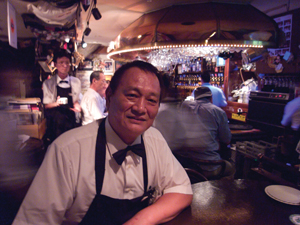Aoki Tatsuo 青木辰男
|
Mr. Aoki Tatsuo is like the godfather: successful, respected and not afraid to look after the interests of the ‘family.’ Mention the neighborhood “Ryogoku” and most people think of sumo; beer lovers are instantly reminded of his beer pub Popeye, which serves 70 different varieties of draft beer. This mainstay is but one of several successful operations he has been involved in over the years. Beyond Popeye’s, Aoki is also a key figure in the Real Ale Festival, the Craft Beer Festival and the Good Beer Club. He has an eye to the future as the craft beer industry in Japan burgeons, but recognizes the political and bureaucratic hurdles stymieing its growth. Sipping on a Weizen, Aoki talks about the work he has done and the work that remains. Koe: How did you become involved in the craft beer industry? Aoki: A friend of mine was connected to Echigo beer, which was Japan’s first craft beer. We sold it here in 1995. About a year later, we started importing barrels from overseas—Rogue was our first. Popeye’s was just a simple pub until then, though I had been lining up Asahi, Kirin and Sapporo at the bar—that was very taboo in those days. K: When and why did you start the Good Beer Club? A: It was 2004. People were just thinking about business all the time. What about the beer itself? I wanted to introduce new beers. I wanted to think about how we can better enjoy beer. I had also discovered real ale and wanted to share that with other tasters. K: What’s necessary for further growth in Japan’s craft beer industry? A: A 1994 law states that you have to produce 60 kiloliters of beer per year. Before that, it was 2000 kiloliters! If you don’t have money and space, you can’t possibly do it. But even 60 is too much. It’s like telling a rice farmer with the average paddy that he has to produce ten times that much if he wants to farm. K: Who determined this number? A: Nihonshu (sake) brewers allegedly pushed those numbers so they wouldn’t loose market share to beer brewers. And there was probably some conservative thought among bureaucrats that they had to protect these traditional businesses. It was the government’s call, but beer is beer and nihonshu is nihonshu. There is not a lot of crossover among the drinkers. I don’t think we affect each other. K: So why hasn’t anything changed? A: Brewers had actually proposed 30 kiloliters as a compromise because 10 kiloliters was what most of the beer world really wanted. I still think that’s too much if you look at places like California where home brewing has lead to some good brewers—Japan has got to do something about those restrictions. K: What would the effect of eliminating this law be? A: I think you’d see the number of micro-breweries expand from 200 to about 500. It could affect some of the bigger companies now producing lines of premium beers. K: Are they pushing back, too? A: Yes. They give the impression of cooperation. We get certain tax benefits when buying ingredients from the bulk importers with which they have huge contracts. But the big beer companies control distribution like a cartel. Take Ginga Kogen Beer, for example. The owner was criticizing the zaibatsu conditions and laws. So some big beer companies, using their power over distribution channels, supposedly threatened to pull their beers from any place also selling GKB. If you are an alcohol retailer, that would destroy your business. A big beer maker later started pushing 100-yen beer promotions around the city to lure more customers to their brand. Well that’s unfair competition; it’s like dumping. K: What would be your ideal? A: Just allow home brewing. A license to sell should still be necessary, but no production minimums. The economic benefits would be enormous. You’d see brewing schools and research institutes. Suppliers would increase. Retailers would increase. Japanese craft beer could be world famous. Japanese have distinct tastes and this would reflect in the beer. It wouldn’t be better beer, per se; but there would be possibilities for new flavors. |
青木辰男氏はいい意味でマフィアのボスを連想させる。やり手で周囲から尊敬され、「身内」に対する気配りを忘れない。両国というと大抵の人は相撲を連想するだろうが、ビール好きにとっては青木が経営する「麦酒倶楽部ポパイ」だ。この店は70種類もの樽生を提供する。青木はこのお店の経営以外にも、リアル・エール・フェスティバル、クラフトビア・フェスティバル、グッドビア・クラブなどに積極的に関わり、日本の地ビールの発展に努めているが、一方でその発展を妨げる様々な規制の存在も認識している。ヴァイツェンビールを飲みながら青木は地ビールに対する思いを語ってくれた。 Koe:地ビールに興味を持ったきっかけは? 青木:日本で最初に地ビールを造ったといわれている「エチゴビール」関係に知り合いがいたこともあり、1995年に全国第一号でエチゴビールを自分の店に導入しました。1年後にはアメリカオレゴン州の地ビール「Rogue」を始め、海外から樽生を取り寄せ始めました。当時はタブーとされていたことですがアサヒ・キリン・サッポロの生も一緒に出していました。当時はまだ普通のビア・パブといった感じのお店でしたが。 Koe:「グッドビア・クラブ」を始めたのはいつ頃ですか?
青木:2004年です。このクラブの活動を通じて皆さんが知らない美味しいビールを紹介したかったし、ビールの魅力というものをもっと知ってもらいたいと思いました。また、リアル・ Koe:日本で地ビール業界が発展するために必要なことは? 青木:1994年の規制緩和でビールの最低生産量が60klに引き下げられるまでは最低生産量2000klという高いハードルでした。これでは余程のお金と場所が確保できない限り地ビールの製造は無理です。しかし60klでもまだ厳しすぎます。平均的な規模の稲作農家に今の10倍の米を作れというのと同じくらい厳しい数字です。 Koe:この規制数値は誰が決めたのですか? 青木:政府がこの数字を決めるに当たっては日本酒の業界団体による圧力があったとも噂されています。政府の側にも日本の伝統文化でもある日本酒の保護という観点があったと思います。規制は政府が決めたことですが、ビール好きはビールばかり飲むし、日本酒党は日本酒ばかり飲む人が多いですから、お互いにシェアを脅かすことは少ないと思うのです。 Koe:ではなぜ事態が進展しないのでしょう? 青木:地ビール業界としては10klまで規制が下がることを望んでいますが、妥協案として30klというラインを提案しています。カリフォルニアなどでは自宅でビールを造り始めた人が優れた地ビールメーカーとして成長していった例がいくつかありますから、こうした例に倣って日本も思い切った規制緩和をするべきです。 Koe:この規制数値が撤廃されたらどうなるでしょうか? 青木:現在200程度の地ビールメーカーが500くらいに増え、現行メーカーに刺激を与えることになると思います。 Koe:大手ビールメーカーによる抵抗はありますか? 青木:あります。彼らは表向きは我々に協力する態度を見せており、彼らが使う大量の原料の輸入契約をしている輸入業者を通じて我々も原料を仕入れることで関税上の恩恵を受けてはいますが、流通に関しては大手ビールメーカーが完全にコントロールしています。銀河高原ビールを造っている会社の例ですが、その会社はいわゆる財閥の既得権益を守る法律が問題だと言っていたのですが、これに対し大手ビールメーカーが銀河高原ビールを扱っている店に不当な圧力をかけてきたという話があります。酒屋さんにとっては商品の確保ができないとなると死活問題です。その後、某大手ビールメーカーはシェアの拡大を目指し「100円ビール」を発売したりしました。こうなるともう公正な競争は無理です。不当なダンピングといえるのではないでしょうか。 Koe:青木さんにとって理想の状態は? 青木:自家製ビールにチャンスを与えるように規制が大幅に緩和されることです。販売が許可制なのは仕方ありませんが、最低生産量に関する規制は無くすべきです。大きな経済効果も期待できます。ビール造りを学べる学校も研究施設も出来、地ビールを扱う業者も小売店も増え、日本の地ビールを世界に発信できるようになるでしょう。日本人の味覚は確かですから美味しいビールが造れるはずです。規制撤廃がすぐに美味しいビールに結びつくわけではないかもしれませんが、新しい味のビールが誕生する可能性が広がることは間違いありません。 |
|
Popeye Beer Club 130-0026 Tokyo Sumida-ku, Ryogoku 2-18-7 03-3633-2120 www.40beersontap.com (note that the “40” of the web address speaks to an older time) |









